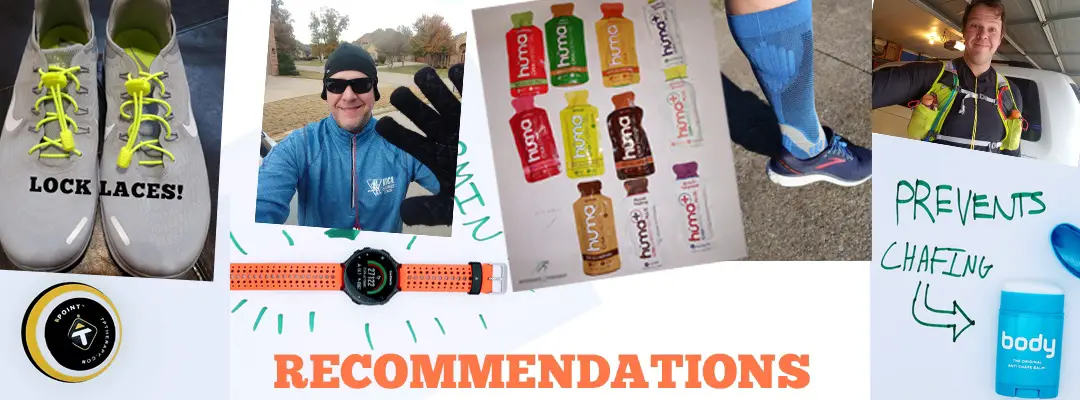Yes, even a beginner runner can take part in a marathon. You can do that as long as you stay committed to training hard and doing whatever it takes to prepare yourself ahead of time. How much time and effort will it take? Well, that depends on your current level of fitness.
Whether you consider yourself to be a couch potato or a beginner runner, you’ve come to the right place. In this article, we’re going to explore everything you need to know to prepare yourself for your first (or next) marathon.
Get excited, and get ready. Your journey to being a marathon runner starts here.
Where To Start?
If you’re asking yourself “Can a beginner runner run a marathon?”, always remember to start small. Your starting point is not the same as that of other people, so you have to start with tiny but achievable personal goals.
If you’ve never trained a day in your life, you can start by walking around the house or the neighborhood.
That’s right; you have to learn to walk before you can run. Once you can walk for a sustained period, perhaps an hour or so, then you can start to increase the intensity of your training.
For Proper running form on flats, hills, sand, ice/snow, and trails (click here).
To do that, you could try walking or jogging a little faster. Challenge yourself with a slight incline, by walking up a slope or uphill.
The reason you have to do all of this gradually is so your body can adjust to the new challenges it faces. Your lungs, your heart, and your muscles all need time to repair themselves and grow stronger.
Can A Non-Runner Run A Marathon?
Yes, a non-runner can indeed run a marathon. Just like in the previous point, it’s always important to remember that your starting point is personal. If you’re a non-runner right now, all that means is that your training is starting at a different point than someone who runs regularly.
As a non-runner, you can start by moving more! Walk around as much as you can, and do it consistently. Walk to the store, walk down the street; it doesn’t matter where you go, just move!
When you do this, you will gradually increase your stamina and endurance. As long as you keep doing this at higher intensities than before, you’ll eventually find yourself ready to run the full length of a marathon.
How Long Does It Take A Beginner To Run A Marathon?
Typically, marathon training programs last anywhere from 12-20 weeks for runners with experience. As a beginner, it’s normal to require more time than that, perhaps even up to 6 months or more.
Remember: running a marathon is not just about physical training. Sure, a lot of it will include physical conditioning, working on your flexibility, and things of that nature. But you’ll also spend that time improving your nutrition and learning about the challenges of marathon running.
Let’s take a closer look at the things you’ll do as part of your marathon preparation:
- Nutrition
To run a full marathon without getting exhausted, you’ll need to learn to optimize your nutrition. Learning how to eat clean and carb-load before race day will ensure that your body can provide you with the energy you need throughout your run. - Mental Preparation
There’s a famous saying that your mind will give up long before your body ever does. A marathon is just as much a challenge of your mind as it is your body, and that’s part of why marathons are so popular with people. - Learning Your Route
Marathons don’t usually happen on a straight, flat road. Instead, you’ll have uphill and downhill slopes, turns, and other geographical challenges in your way. Part of your training should include familiarising yourself with these obstacles that you’ll face on the day of the marathon.
How Long Does It Take To Become A Runner?
Is It Okay To Walk During A Marathon?
Yes, it’s perfectly fine to walk during a marathon. Race organizers do not punish or disqualify runners for walking during a marathon. But if you want to be extra careful, you can always ask them ahead of time.
Typically, runners will slow down to a walk for plenty of different reasons. Here are just a few typical examples.
Are you still interested in walking a marathon, find out How Long It Takes To Walk A Marathon?
To Preserve Energy
Walking can be a tactic that you use to preserve your energy. You see, it takes a long time to complete a marathon, and most people can’t sustain themselves if they run from start to finish. So, they strategically slow down to a walk at specific points along the route to catch their breath and recharge.
That way, they can save their energy for more challenging parts of the marathon.
To Take A Break
Marathons are mentally challenging, and sometimes people need to take a break. By slowing down to a walk, marathon runners can clear their head, catch their breath, and regain their composure.
Participants Are At Different Fitness Levels
At a marathon, you’ll see participants who are at different levels of physical conditioning. Some people tire out faster than others, which is why you’ll notice some people walking during a marathon.
Can You Train For A Marathon On A Treadmill?
Yes, a treadmill is an excellent way to train for a marathon. There are plenty of benefits to using a treadmill for your marathon training.
Let’s take a few of the benefits.
Indoor Training
A treadmill is a fantastic tool for marathon training because you can use it indoors. Even when its raining or snowing heavily outside, you can still stick to a consistent training schedule with a good treadmill.
Controlled Inclines
With most treadmills, you can increase and decrease the incline of your run as you please. That’s great because it allows you to add a lot more variety to your runs, so you’ll be better prepared for your marathon.
Easier To Track
Treadmills also tend to have displays that will help you measure all the essential variables. That includes the duration of your run, how many calories you’ve burned, and more.
How Hard Is Running Your First Marathon?
Running your first marathon is very challenging, but it gets easier the more you do it. Your first marathon will be the toughest for one simple reason: you are going to experience everything for the first time, and that can get overwhelming.
No matter how much you study the mental and physical challenges of marathons, you will not understand them until you experience them for yourself. That will happen during your first marathon, which makes the run all the more difficult.
You might feel tempted to give up half-way through, which is why it’s essential to pay attention to your self-talk. Out there on your run, you are your own coach, cheerleader, and support system.
Your first marathon will be very hard, so you’ll need to talk yourself through it to the end.
Determining Your Limits
One of the biggest mistakes that new marathon runners are often guilty of is pushing themselves too hard, too soon. To be a successful marathon runner, you have to know and respect your own limits.
How do you determine your physical limits? You can discover them first-hand during your training. Those discoveries are valuable because you’ll know when to slow down and take breaks during a real marathon.
When you feel like you’re hitting the limits of your stamina, you can slow down and catch your breath before continuing to push towards the finish line.
Consistent Running
Running gets easier with time, as long as you do it consistently. That’s why all marathon training programs demand consistency, and so should you.
Even if your marathon preparation begins with a slow walk around the neighborhood, doing it consistently will ensure that your stamina continues to grow stronger.
So, whether you’re training every day or three times a week, always stick to the plan.
Running Shorter Distances First
Don’t be afraid to start small! You have to walk before you run, and you have to do it over shorter distances before you can run a full marathon.
Use your local geography to your advantage. Learn to walk around the neighborhood more often. Instead of driving or biking to the grocery store, strap on your jogging shoes and walk or run there.
Before you know it, you’ll find these short running distances too easy. You’ll start looking for more reasons to run farther and longer just to test yourself.
Marathon Training Plan For Beginners
As a beginner, you must remember to build your training plan according to the four building blocks of any effective marathon training program: base mileage, long runs, speed, and recovery.
Base Mileage
Base mileage is all about gradually building your maximum running capabilities. Whenever you run, you should aim to complete a certain amount of distance in a fixed period. Every week or so, you can adjust those targets slightly higher. That way, your stamina, and speed will increase steadily.
Long Runs
Once a week, you should go on a long-distance run. That will get you familiar with running longer distances without hurting yourself in the process.
You shouldn’t run long distances too often especially at a faster pace or at a race pace. There are people that do run consecutive marathon distances daily, however, this is only for a short time frame and usually, they’re doing it to break a record. Most importantly, they are NOT RUNNING EACH MARATHON DISTANCE FAST. Doing that will increase your chances of injury, and you might end up burning yourself out.
So, in addition to your regular runs, you should have the occasional long-distance run to train your body to run a marathon.
Speed
Completing a marathon is also about your running speed and not just your distance. Running at different tempos or intervals will help to increase your stamina and improve your finishing times.
Recovery
All physical training programs must incorporate plenty of rest and recovery. You see, your body gets stronger when it repairs itself after a training session. So, plenty of sleep and rest will help your body recover faster.
What Marathon Finishing Time Should I Aim For?
Most people finish a marathon in under 6 hours, so that is a good finishing time for most beginners to aim for. Only the top marathon runners in the world, a tiny number of people, end a marathon in under 3 hours.
Remember: in a marathon, you are competing with yourself more than anyone else. For some people, finishing a marathon is a fantastic feat in itself, no matter how long it takes. So don’t feel bad if you think you take too long to finish the entire course.
As people often say: it doesn’t matter how slow you go, you’re still faster than the people who never even started!
What Should I Do If I Miss Some Of My Marathon Training Plan?
| Help support me and subscribe to my YouTube channel. YouTube video - 30 ways to make your runs less painful! Coach Scott's Credentials:
|
To sign up for a FREE half marathon training schedule, log sheet, and pace predictor CLICK HERE.

Recommended gear for runners
Connect with me:
| facebook.com/BeginnerToFinisher/ |
If you ever miss a part of your training plan, don’t give up! Get right back on it as soon as you can without punishing yourself for it.
Remember: consistency is the key, NOT perfection.
I’m Finding The Training Hard, How Do I Know When I Need To Back Off?
If you’ve been training hard for a long time, always be on the lookout for signs of burnout. Losing your motivation, performing poorly (compared to before), and losing your passion are all clear signs that you’re overtraining and burning out.
When you find yourself in this position, it’s essential to turn down the intensity of your marathon training. Cut your training routine down to the bare minimum, and focus your attention on self-care. Eat healthy meals, always stay hydrated, and get plenty of rest.
Listen to your body, because it’s trying to communicate with you. When your body feels ready to return to more intensive training, only then should you start training harder. And just like before, always do it gradually and never go back to 110% straight away.
What About Strength Training For A Marathon?
Strength training offers you two advantages when it comes to marathon running. Firstly, it contributes to your overall fitness, which will help you run a marathon faster and easier. Plus, it’s a great way of adding variety to your marathon training program.
By using strength training, not only are you training to become a more powerful runner, but you’re also reducing the odds of burning out.
Marathon Motivation
Are you looking for motivation to run a marathon? Here are 20 reasons why you should run a marathon.
Are You An Absolute Beginner Runner?
If so make sure that you check out this post I’ve spent a lot of time gathering information on:
Related: 22 Running Tips For Absolute Beginners!
| Help support me and subscribe to my YouTube channel. YouTube video - 30 ways to make your runs less painful! Coach Scott's Credentials:
|
To sign up for a FREE half marathon training schedule, log sheet, and pace predictor CLICK HERE.

Recommended gear for runners
Connect with me:
| facebook.com/BeginnerToFinisher/ |


Thankyou for a really informative, inspiring article. I have started the process, hoping for success 20 weeks ahead
You are most welcome. Don’t forget that during your training you might have absolutely horrific runs that occur. If this happens shake it off and start looking at the next run in your schedule. Most new runners don’t realize that there is already a buffer/cushion of running volume in your training that allows for these slight adjustments to happen. Just don’t make these adjustments a habit! Good luck with the next 20 weeks of training and ultimately – the race.